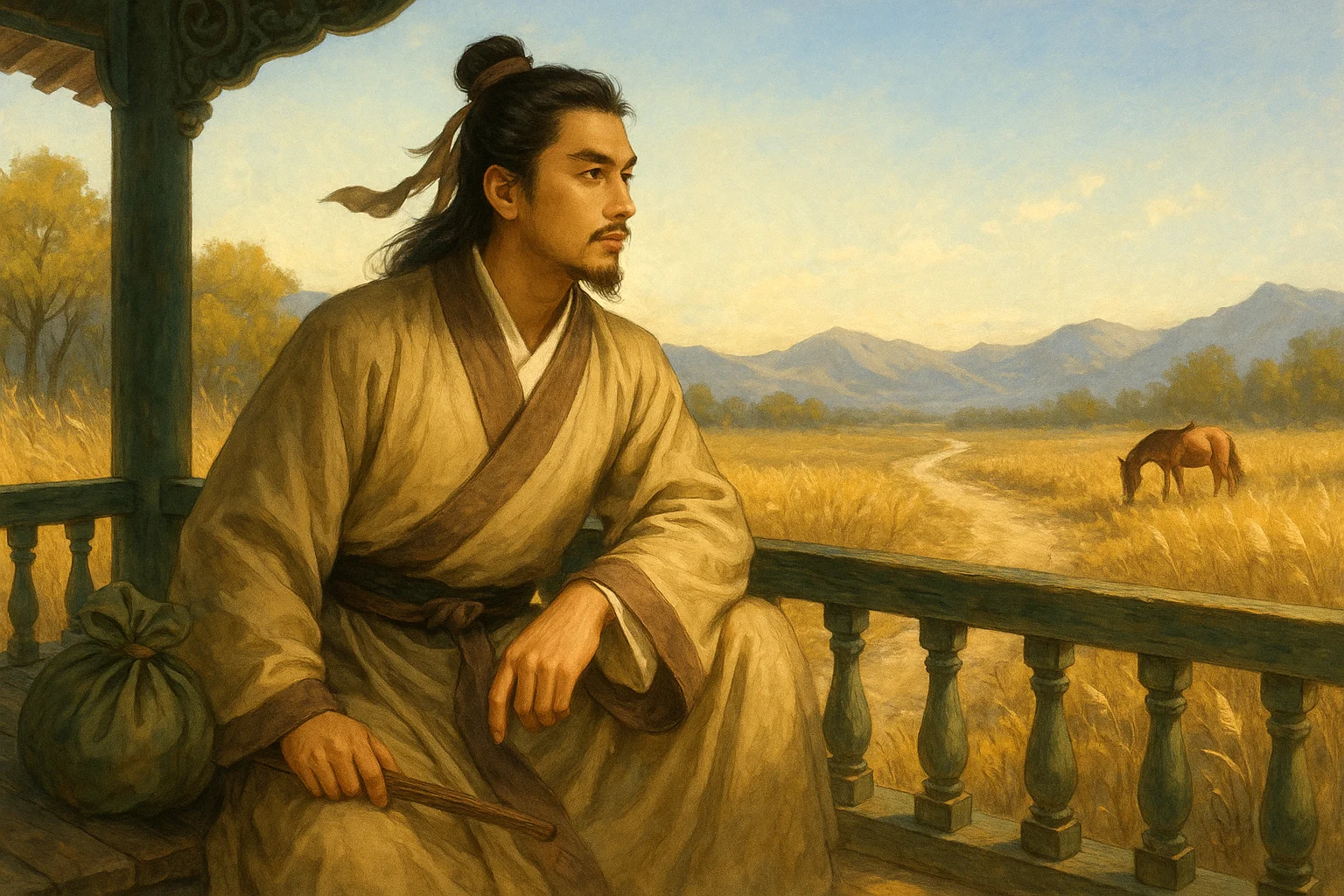My autumn grief is not for fleeting years,
But for lost springs in jade-green homes of yore.
Yet in withered leaves, a stubborn hope appears—
Red dogwood berries bloom like flowers once more.
Original Poem
「秋园」
司空曙
伤秋不是惜年华,别忆春风碧玉家。
强向衰丛见芳意,茱萸红实似繁花。
Interpretation
"Autumn Garden" by Sikong Shu, a mid-Tang poet, is believed to have been composed during his later years of reclusion or wandering. Through autumnal garden imagery, the poem expresses nostalgic remembrance and emotional transition. Writing during the late Tang's literary decline, Sikong Shu was known for his understated elegance and subtle lyricism—qualities fully embodied in this meditation on aging that uses "autumn grief" to veil deeper reflections on time's passage. While ostensibly depicting scenery, the work ultimately reveals emotional landscapes.
First Couplet: "伤秋不是惜年华,别忆春风碧玉家。"
Shāng qiū bùshì xī niánhuá, bié yì chūnfēng bìyù jiā.
This autumn grief mourns not passing years— / But springtime parting from my jade-green love.
The opening confesses directly: seasonal melancholy stems not from aging, but from memories of a spring farewell. "Jade-green love" (碧玉家) alludes to a beloved woman through classical gemstone imagery, blending refinement with unhealed longing—revealing emotions that time cannot erase.
Second Couplet: "强向衰丛见芳意,茱萸红实似繁花。"
Qiáng xiàng shuāi cóng jiàn fāng yì, zhūyú hóng shí sì fánhuā.
I search wilted thickets for lingering fragrance— / Cornelian cherries' red fruit glow like blooms.
Shifting to the garden, the poet projects inner struggle onto nature. "Search wilted thickets" (强向衰丛) conveys forced optimism, while cornelian berries' unexpected brilliance—though not actual flowers—becomes a metaphor for enduring beauty in decline. This bittersweet vision acknowledges loss while finding solace in memory's afterglow.
Holistic Appreciation
Though merely four lines, Autumn Garden achieves a profound fusion of scene and emotion. With economical brushstrokes, the poet sketches a solitary figure wandering through an autumn garden, their heart brimming with unspoken longing. The opening line clarifies that the "grief of autumn" lies not in lamenting passing years but in memories of bygone spring breezes and departed companions. This emotional focus elevates the poem beyond superficial melancholy over aging, deepening it into spiritual reflection. In the latter half, the red berries of autumn dogwoods symbolize past warmth, while "like blooming flowers" evokes springtime recollections—subtle yet resonant, with emotion arising organically to create lingering beauty.
Though depicting autumn, the poem harbors spring’s spirit; though touched by sorrow, it avoids gloom. It finds warmth in decay and tenderness in decline, revealing a poet whose advanced age has not dulled his sensitivity. The work exemplifies Sikong Shu’s signature artistry: using understated ink to depict profound truths.
Artistic Merits
- Emotion Through Scenery, Reason Through Feeling: The "autumn garden" serves as a surface for hidden sentiment—scene and feeling intertwine with restrained depth.
- Sparse Language, Rich Meaning: These four concise lines explain the source of autumn’s grief while refracting inner turmoil through garden vistas, proving less can indeed be more.
- Symbolic Alchemy: The line "dogwood berries red as blossoms" ingeniously adapts Double Ninth Festival customs, comparing autumn fruit to spring flowers to create dual temporal and emotional symbolism that transcends seasons.
Insights
What truly moves us amid time’s flow is seldom aging or autumn itself, but rather those who’ve vanished like wind. Though years strip away youth and springscapes, memory’s warmth can still flicker anew amid withering. By writing "spring" into "autumn" and likening fruit to flowers, the poet achieves a seasonal transcendence. This reminds us that even in life’s late autumn, traces of affection and beauty may be rediscovered—a mere "hint of blossoms" can suffice to solace the soul.
About the poet

Sikong Shu (司空曙), c. 720 – c. 790, courtesy name Wenming, was a native of Guangping (present-day Yongnian County, Hebei Province). A renowned mid-Tang dynasty poet, he was one of the "Ten Literary Masters of the Dali Era," alongside Lu Lun, Qian Qi, Han Hong, Li Duan, and others. Though his life lacked illustrious achievements, his poetry—marked by genuine emotion in simplicity and profound contemplation in solitude—secured him a unique place in mid-Tang literary circles.












